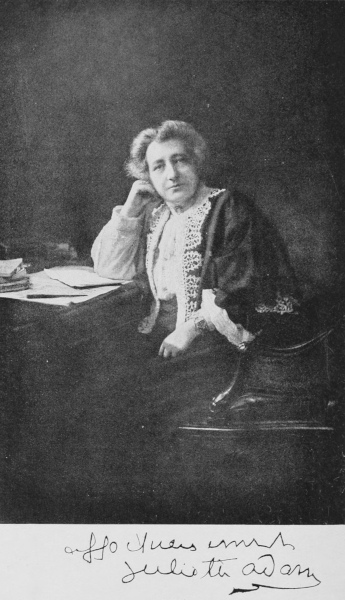MADAME ADAM
MADAME ADAM
(JULIETTE LAMBERT)
LA GRANDE FRANÇAISE
FROM LOUIS PHILIPPE UNTIL 1917
BY
WINIFRED STEPHENS
AUTHOR OF “FROM THE CRUSADES TO THE FRENCH REVOLUTION,”
“FRENCH NOVELISTS OF TO-DAY,” “MARGARET OF FRANCE,”
ETC., ETC.
WITH EIGHT ILLUSTRATIONS
NEW YORK
E. P. DUTTON & COMPANY
Printed in Great Britain by
Richard Clay & Sons, Limited,
BRUNSWICK ST., STAMFORD ST., S.E. 1,
AND BUNGAY, SUFFOLK.
PREFACE
La Grande Française[1]
Professor of Energy,” a term first applied toNapoléon I, is a title which has been bestowed on more thanone living Frenchman. None has better claim to it thanMme. Adam, La Grande Française, as she has been happilycalled, the story of whose life, which is now running into itseighty-first year, is told in the following pages.
To write Mme. Adam’s biography is also to write one ofthe most momentous chapters of French history. For thisremarkable woman has lived through the Revolution of1848, the coup d’état of 1851, the agony of the siege of Paris,the civil war of the Commune, and two invasions of herbeloved patrie.
As the mistress of a leading political salon, as the founderand editor for twenty years of an influential fortnightlymagazine, La Nouvelle Revue, as for many years the intimatefriend of Gambetta, of Thiers, of other French ministers,of the representatives of foreign powers and of such eminentFrench writers as George Sand, Flaubert, Victor Hugo,Alphonse Daudet, Pierre Loti, Paul Bourget and MauriceBarrès, she has not only kept her finger on the pulse ofher great nation, but she has to some extent modulated itsheart-beats.
The key to Mme. Adam’s temperament and to all thevaried phases of her career is her passionate belief in self-government,in that cause of national independence forwhich the powers of L’Entente are now engaging in thisworld-embracing conflict. We may call it a belief, butoriginally in Mme. Adam’s case it was an instinct born inher and inherited from her father, one of the most ardentof revolutionaries. Mme. Adam is a revoltée to the core.Toujours hors des rangs, Gambetta said of her. In numerousincidents of her childhood her rebelliousness revealed[Pg vi]itself. The growth of her reasoning powers, however, ledher to submit to discipline, to embrace with fervour—shecan never do anything by halves—the republican creed,and to become the irreconcilable adversary of the SecondEmpire. Then the national defeat of 1871, acting uponwhat she has described as her combativité rentrée (her suppressedcombativeness), turned her passion for self-government
